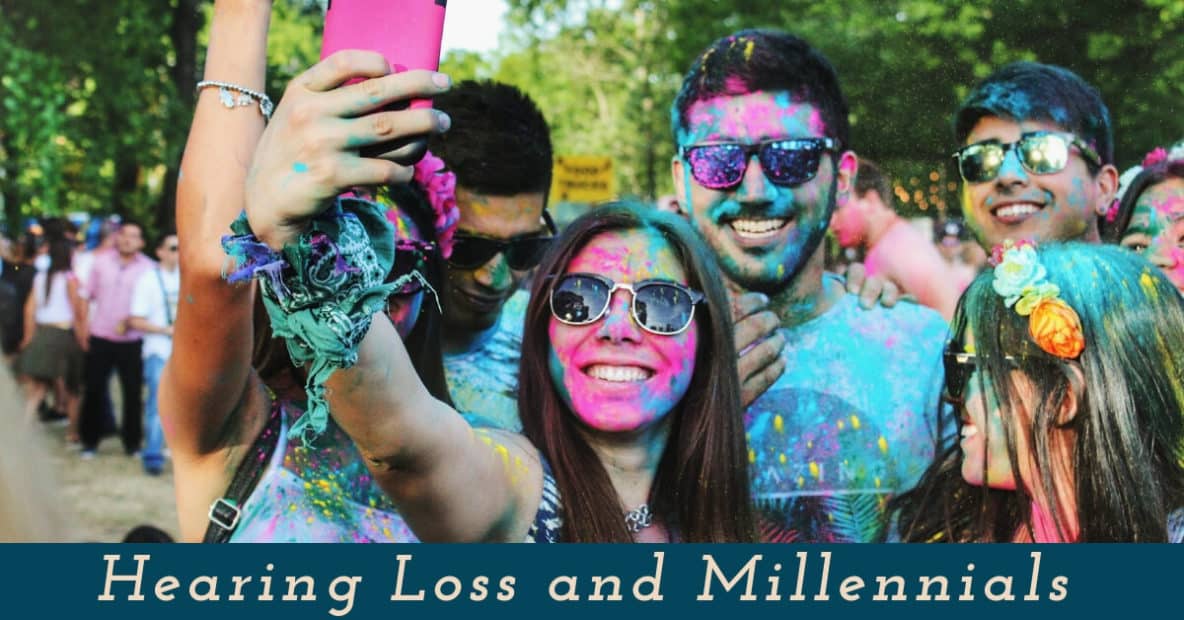0% financing available. Up to 3-year loss and damage guarantee.

Hearing Loss and Millennials
- Navigating the Conversation: The Significance of Thoughtful Disclosure in Hearing Loss - December 10, 2023
- The Sound of Dreams: Understanding How Hearing Loss Impacts Dreaming - November 7, 2023
- Traveling Effectively with Hearing Aids - October 16, 2023
Many of us associate hearing loss with aging, but new studies are showing that noise-related hearing loss is dramatically transforming the hearing of young millennials. Noise related hearing loss can occur whenever our hearing is overly taxed by loud sounds. Historically, rates of hearing loss have skewed older, but with the adoption of new technologies and new cultural norms, that may be changing.
How Noise Related Hearing Loss Works
Most young people don’t realize that most hearing damage is irreparable – once we lose part of our ability to hear, it is gone. Noise related hearing damage often occurs when the delicate sensor cells we depend on in our inner ear are pushed beyond their limits. “Hair cells” are the tiny nerve cells that respond to sound waves traveling through the air. Their job is to convert the sound wave into an electric signal that is sent to the brain. The brain performs the near instantaneous work of interpreting meaning from the noise.
The hair cells perform a critical role in our hearing and they are also uniquely vulnerable. Unlike other cells in the body that can repair or replace themselves if they are harmed, hair cells have no means of restoring themselves once they are damaged. This means a hair cell is permanently out of service once it becomes damaged.
Loud sounds overburden our hearing. It stretches the capabilities of the hair cells to their breaking point. Frequent exposure to harmful noise volumes means that gradual hearing loss is occurring, accruing to the point it makes a significant difference in how well we hear. Part of hearing loss occurring as we age is this accrual of hearing damage. For older people, the hair cells also get more fragile and injury-prone as we age making hearing damage more likely.
Hearing Loss Is Going Younger
Today, over 1.1 billion young adults and teens worldwide are categorized as “at-risk” for noise related hearing loss. Part of this is living in noise-polluted areas where high-volume noise is an everyday fact of life. Another factor is the widespread use of headphones and ear buds, listening to music, video games and other media at ear-splitting volume. Leisure activities have similarly gotten far louder with sports events and concerts projecting sound at decibel levels that are only safe to listen to for a few minutes.
Young people have trouble understanding the ramifications of their actions. Even dealing with tinnitus -a ringing in the ears- may not alert them to the consequences of permanent hearing damage. It is important for parents and teachers to emphasize healthy hearing behavior early on and to encourage life-long hearing health.
Millennials are also more inclined to not seek help for their hearing loss. With most hearing loss developing gradually, it may be easy to procrastinate or even fail to recognize hearing problems. It is important to treat noise-related hearing loss when it begins. The longer hearing loss is allowed to develop untreated, the more difficult it becomes to adapt to assistive devices like hearing aids.
Hearing Loss and Millennials
One major difference audiologists are seeing with younger patients is the way hearing loss affects lifestyle. Older adults are often retired from work and finished with schooling when hearing loss enters their life. Now, many millennials are in the thick of their education or entering the job market when hearing loss first becomes an issue. Trouble hearing can hurt are ability to both learn and earn, as well as making it harder to socialize and network with peers.
Hearing loss, when left untreated, has the capacity to drastically alter a person’s quality of life, making them vulnerable to depression, anxiety and isolation as well as health risks like heart disease. By ignoring the onset of hearing loss, young people may be establishing an uphill battle for overall healthfulness.
There’s good news for everyone facing hearing loss. While hearing loss can’t be reversed, it can be effectively managed. Treating hearing loss can help rehabilitate hearing and comprehension and restore the ability to communicate and comprehend. Hearing aids are becoming more powerful and they can integrate with mobile technology for easy adjustment and streaming sound. In addition to powerful sound processing, hearing aids have gotten a sleeker profile and can be worn discreetly behind the ear or in the ear canal.
Advanced Tech Hearing Aid Centers
Looking for the right place to start your journey to healthy hearing? Advanced Tech Hearing Aid Centers has the best care and full selection of custom hearing solutions. If you’ve noticed a recent change in your hearing, it’s time to get it examined. Contact us for an appointment today.
